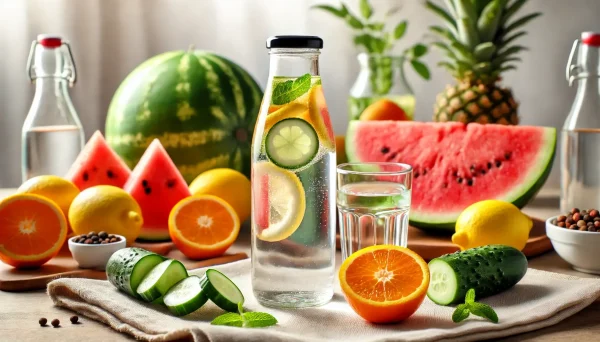Water is essential for every function in the body, yet many people do not drink enough of it daily. Staying hydrated supports digestion, brain function, energy levels, and overall health. Dehydration, on the other hand, can lead to fatigue, headaches, poor concentration, and even long-term health problems. Understanding the importance of water and how to stay properly hydrated can have a significant impact on your well-being.
1. Water Supports Brain Function and Mental Clarity
Even mild dehydration can impair concentration, memory, and mood. The brain is composed of about 75% water, and when fluid levels drop, cognitive function declines. Drinking enough water throughout the day keeps your mind sharp, improves focus, and helps prevent mental fatigue. If you often feel sluggish or find it difficult to concentrate, increasing your water intake may make a noticeable difference.
2. Hydration Improves Energy Levels and Reduces Fatigue
Water plays a crucial role in delivering oxygen and nutrients to cells. When you are dehydrated, your heart has to work harder to pump oxygen throughout your body, leading to feelings of tiredness. Instead of reaching for caffeine when you feel fatigued, try drinking a glass of water to naturally boost your energy levels.
3. Water Aids Digestion and Prevents Constipation
Proper hydration is essential for a healthy digestive system. Water helps break down food, absorb nutrients, and prevent constipation by keeping the intestines lubricated. Drinking enough water also supports the production of stomach acid and enzymes, which are necessary for breaking down food efficiently. If you struggle with digestive issues, increasing your water intake may help improve gut health.
4. Drinking Water Helps Regulate Body Temperature
Water helps maintain a stable body temperature by regulating sweat production and circulation. When the body overheats, sweating helps cool it down, but dehydration can reduce the body’s ability to regulate heat. This is especially important during physical activity or hot weather, as dehydration can lead to heat exhaustion or heat stroke.
5. Hydration Supports Healthy Skin
Drinking enough water helps maintain skin elasticity, reduce dryness, and prevent premature aging. While skincare products can help externally, hydration works from the inside out. When you are properly hydrated, your skin appears more radiant and plump. Dehydration, on the other hand, can lead to dryness, flakiness, and an increased appearance of fine lines.
6. Water Helps Flush Out Toxins and Supports Kidney Function
The kidneys filter waste from the blood and eliminate toxins through urine. Drinking enough water ensures that your kidneys function properly and prevents kidney stones by diluting minerals that could crystallize into stones. Proper hydration also reduces the risk of urinary tract infections by flushing out bacteria from the bladder.
7. Drinking Water Can Aid in Weight Management
Water can support weight management by promoting a feeling of fullness, reducing unnecessary snacking, and improving metabolism. Sometimes, thirst is mistaken for hunger, leading to unnecessary calorie consumption. Drinking a glass of water before meals can help prevent overeating and support healthy digestion.
8. Dehydration Can Lead to Headaches and Muscle Cramps
One of the most common symptoms of dehydration is headaches. When the body lacks water, blood flow to the brain decreases, leading to discomfort. Muscle cramps can also occur due to an imbalance of electrolytes caused by dehydration. Ensuring proper hydration can help prevent both headaches and muscle stiffness, especially after exercise.
9. How Much Water Should You Drink?
The general recommendation is to drink at least 8 glasses (about 2 liters) of water per day, but individual needs vary based on activity level, climate, and overall health. A good way to check hydration levels is to monitor the color of your urine—light yellow indicates proper hydration, while dark yellow may signal dehydration.
10. Tips to Stay Hydrated Throughout the Day
Carry a reusable water bottle with you to remind yourself to drink water regularly. Set reminders on your phone or use a hydration app to track your intake. Flavor your water with natural ingredients like lemon, cucumber, or mint for a refreshing twist. Eat water-rich foods such as watermelon, oranges, cucumbers, and lettuce to increase hydration. Drink a glass of water first thing in the morning to kickstart your metabolism and another before each meal to aid digestion.
Final Thoughts
Hydration is one of the simplest yet most effective ways to support your overall health. From brain function to digestion and skin health, water plays a crucial role in keeping the body running smoothly. Making a conscious effort to drink more water daily can lead to noticeable improvements in energy, focus, and overall well-being. How do you ensure you stay hydrated throughout the day? Share your tips in the comments!







